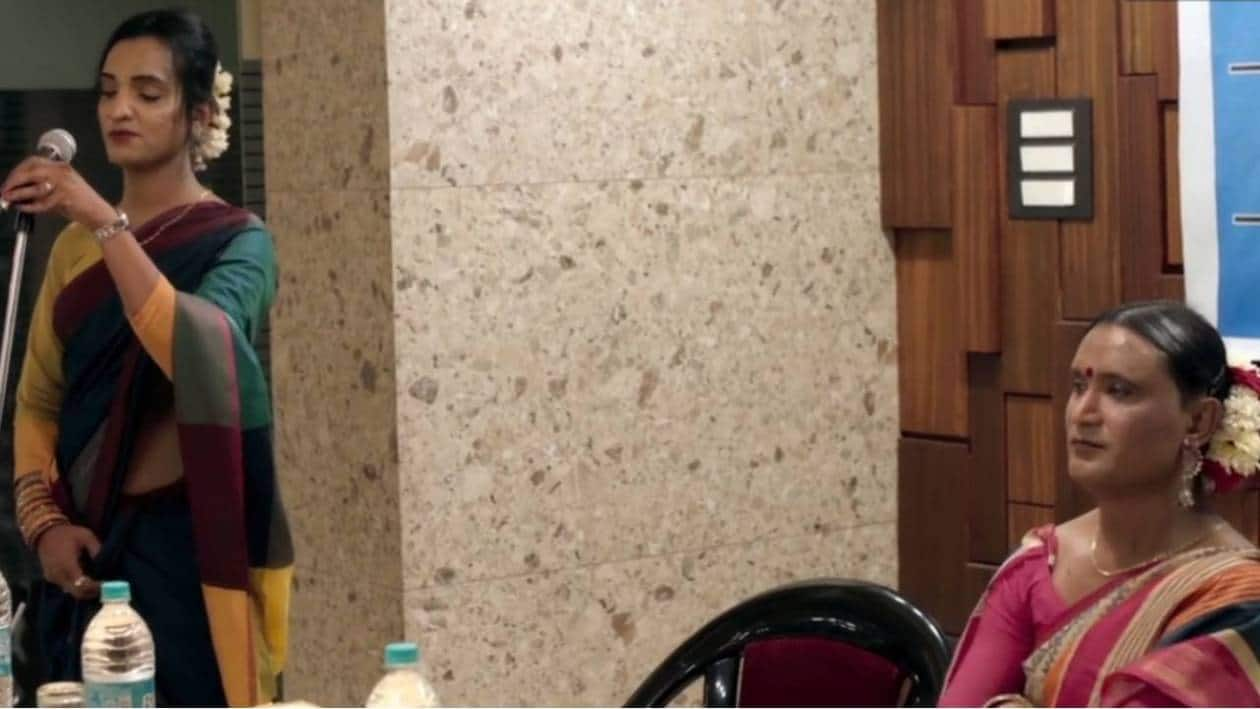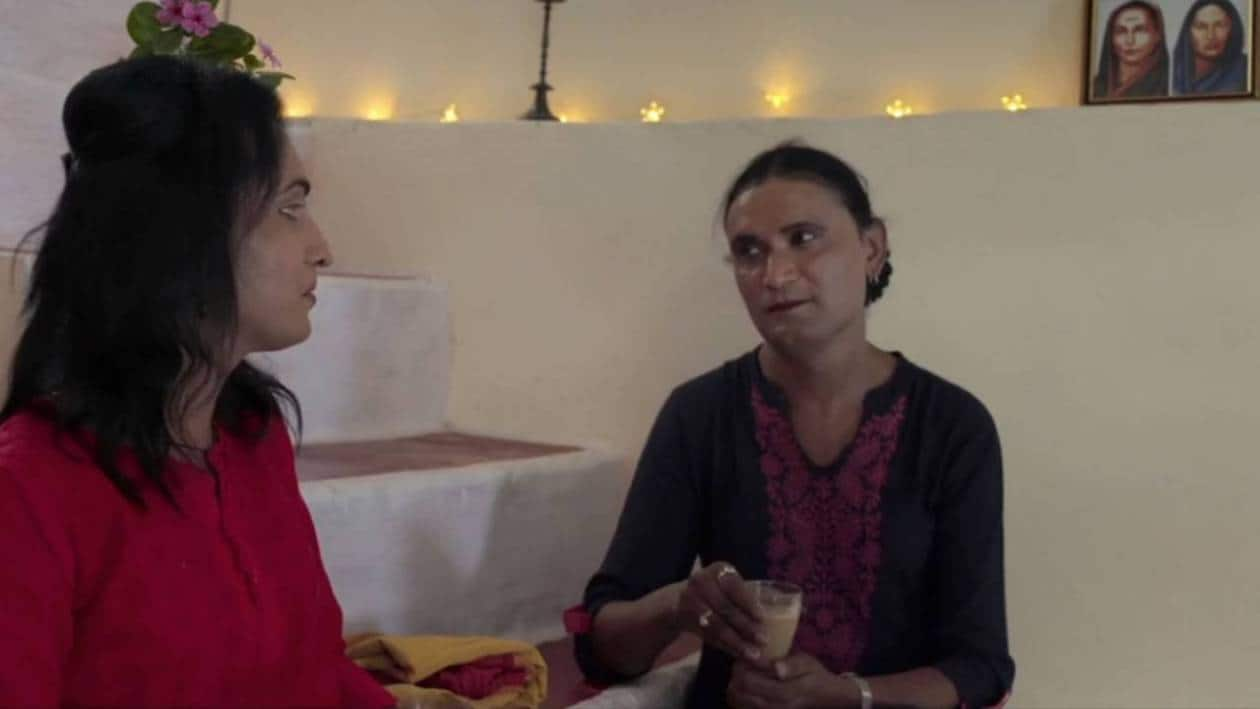



In an affecting scene in Saim Sadiq’s festival favourite, and Pakistan’s 2023 Oscars entry, Joyland (2022), transwoman Biba (Alina Khan) goes sits in the ladies’ compartment in the Metro, where a female co-passenger tells her to go sit in the men’s coach. Haider, who was observing this from a distance, comes and sits between that woman and Biba. A smile — a crucial feat — waltzes across both their faces. The cis-het Haider is that rare symbolic liminality, an ally, needed to bridge the discriminatory, gendered social gap. This could very well happen on the Delhi Metro and anywhere in South Asia. In Bhopal, Laila (Manisha Soni) points towards a lake island and tells Roshni (Muskan), in jest of course, that that is where they should make a home of their own. The fount of their laughter stems from a shared suffering. Laila and Roshni helm Ektara Collective’s second feature film, Ek Jagah Apni (A Place of Our Own), a simple story of a complex reality. It is transwomen’s quest for a home, a safe haven, their joy land — and, in effect, for dignity and social standing — that informs the film.
 Manisha Soni (as Laila, left) and Muskan (as Roshni) in a still from 'Ek Jagah Apni'.
Manisha Soni (as Laila, left) and Muskan (as Roshni) in a still from 'Ek Jagah Apni'.While Joyland moved the world and picked two awards at this year’s Cannes Film Festival, NFDC Goes to Cannes was showcasing Ek Jagah Apni at the Cannes film market. “People in Cannes were so nice. They accepted and welcomed me for who I am — an actor — and didn’t see or treat me any different, as a trans. Confidence paida hua ki yahan gender nahin talent dekhte hain (a new confidence was born when I realised that, there, talent and not gender is looked at),” Alina Khan told me after the Cannes win. Closer home, enough and more independent films have embarked upon that search for ek jagah apni, a place of their own, in a society which doesn’t even want to understand the difference between transgender and intersex.
After its world premiere in Tokyo, the Ektara Collective’s Maheen Mirza and Rinchin co-directed film, which premiered in India this week, at the 27th International Film Festival of Kerala (IFFK), in the prestigious 14-film International Competition, has won two awards: FFSI KR Mohanan Award (Certificate of Merit) and a Special Mention award for the lead actors Manisha Soni and Muskan, who are both non-actors. Earlier this year, the state had awarded another trans actor, Negha S for Antharam (Kerala State Film Awards).
Indian cinema (spearheaded by Bollywood and the southern film industry), however, is light years removed from what Sadiq could imagine. Sadiq stripped the transness of the trans character to give her equal importance as the man and the woman protagonist in his cinematic universe — because society and commercial/mainstream movies don’t. While here, we are still buying tickets and subscriptions to watch non-transpersons play trans characters on screen, from Akshay Kumar (Laxxmi Bomb), Vaani Kapoor (Chandigarh Kare Aashiqui), to Kalidas Jayaram (Paava Kadhaigal) and Vijay Sethupathi (Super Deluxe). Popular Bengali queer director Rituparno Ghosh, and commercial cinema of his sensibility, is dead. Today, there exist very few exceptions, like the judge Sudha S in the courtroom drama Gargi, but they remain minor, even if sometimes important, characters.
Sensitivity and profit-making don’t see eye to eye, thus sounds the broken record of many a big production house. That fortitude lies elsewhere, in those who back documentaries and indie films. In such films as Lotus Visual Productions’ Ek Jagah Apni, and Sankhajit Biswas’ Bengali docu-feature Hridoy Bosot (A Home for My Heart).
Ek Jagah Apni tells a human story. It follows Laila’s struggle to rent an apartment in Bhopal. An NGO counsellor, the BA-pass Laila wants a decent home in a respectable locality. Her friend Roshni, a cook and cleaner at a government official’s home, gives her strength as well as a reality check, “we’ll look for a good locality later, all we can hope for now is a roof over our heads.” They have an ally in Shahrukh, the autorickshaw driver, who ferries them around. The quest for home, after hunger, is a primal need of the human condition.
Being trans, however, is not a “condition”, Laila interjects a tone-deaf writer speaking to “these kinds of people” in the film. It is their reality, Laila says, echoing what Alina had said earlier, “You just can’t put a wig and a dress on a man and he doesn’t become a trans. Banawati nahin hai. It’s natural.” But heteronormative, transphobic societies such as ours see gender-transgressive individuals as outliers, an outcast. Landlords are unwilling to rent out flats to trans persons, evict them at the slightest of pretexts, even rough them up when their identity is revealed, as we see in Ek Jagah Apni. It is a life mired in a conundrum between wanting to assert one’s identity and living with head held high (Laila having to share a bank account in her previous name, Harish) and seeking peace of mind by living by compromise and concealment (domestic worker Roshni’s Brahmin bureaucrat owners don’t know about her being a transgender and from a lower caste). Daily violence — physical, verbal, mental, and sexual harrassment — is par for the course. As Laila says in the film, poignantly, no procession or candle marches are taken out when a trans person is raped, it doesn’t even make for a newspaper headline.
Ek Jagah Apni’s power lies in stripping a story about trans people from any kind of activism, complex narratives or loud pronouncements. It’s a staid look at one aspect of their mundane, oppressive reality — how their gender identity becomes the roadblock for them in finding a roof above their head. That is a reality many single women (religion and caste notwithstanding) and single men (mostly Muslim) also have to face today in the metros. Why the search for a home? Because, as Roshni says in the film, “families don’t accept us, and when they do, relatives and society won’t let them to.”
The film is based on a script by Mirza and Rinchin with inputs from Soni and Muskan, real-life trans women who channel personal experiences with great restraint. The level-headed, practical Roshni cocks a snook at the ways of the world, with reserve and humour. She exhibits the experienced calm of a riverbed that has withstood many a flooding. No victim card is brandished. No one-tone, over-dramatisation. While the fact that Roshni’s employers don’t know about her trans identity might seem like a pig in the poke, it is based on Muskan’s own experience at a Bhopal bureaucrat’s home.
 A still from 'Ek Jagah Apni'.
A still from 'Ek Jagah Apni'.Looking for a place to call home also becomes a metaphor for Ektara Collective creating a space where such stories can be told. What is Ektara Collective? A Bhopal-based collective of independent filmmakers and amateurs, a diverse group that cuts across socio-economic and gender intersectionality. The collective’s work, in its 12 years of existence, include short films Chanda Ke Joote, Jaadui Machchi, Hotel Raahgir, and a full-length feature Turup. They also make music videos. And music is the icing on the cake in Ek Jagah Apni. The soulful music, with dulcet harmonium notes, and such ditties as Begumpura, Guru Ravidas’ composition, which calls for a classless, casteless society, eschews any pathos from the way the viewers perceive of a reality that isn’t their own.
If cinema has disenfranchised the LGBTQIA+ community, the trans persons especially in a damaging way, then cinema is Ektara Collective’s site of rebellion. And, as Rinchin has said in an interview, “for any political thought formation, it is important to occupy cultural spaces… What if we made our own (cinema)?”
'A Place of Our Own/Ek Jagah Apni' directed by Ektara Collective received the FFSI K.R. Mohanan Certificate of Merit.#iffk#27thiffk#films#cinema#filmfestival#closingceremony#awardspic.twitter.com/hkVBNIdNJ3— International Film Festival of Kerala (@iffklive) December 17, 2022
Can genuine equality between the sexes exist? If the communist Mao Zedong is to be believed, it can exist but can only be realised in the process of society’s socialist transformation as a whole.
It goes without saying that the IFFK win for Ek Jagah Apni, in a communist-led state, is a win for the trans community but is also a win for socialist filmmaking. For a cinema by, of and for the people/locals. That the film is going places speaks of the universality of its subject’s rootedness. Ektara Collective, then, is an instance of the proletariat that is stirring a mini working-class revolution in deconstructing the bourgeois means of production of cinema, and the hegemony big-studio profit-oriented cinema enjoys over the means of its product's (films') consumption.
Cinema is an SRK dancing in fields of mustard as much as it is an Om Puri railing against the State at a house party. Cinema, like theatre, is a powerful tool, to speak for the voiceless, the marginalised. To borrow from Albert Einstein, the cure for the real source of evil, i.e. the economic anarchy of capitalist society — and by extension, capitalist cinema/filmmaking — lies in collective ownership. Ektara Collective is an instance of that. Their first feature film, the cinema vérité Turup (Checkmate, 2017) — which, through three women's lives, cuts across religion, caste, class, gender against the backdrop of fundamentalism — had no directors, it was produced and owned by a group of individuals. Thus, subversive victory lies in such voices and stories, doesn't matter who the creators are, in creating ek jagah apni in the microcosms of our society — from social media to the OTTs.
Discover the latest Business News, Sensex, and Nifty updates. Obtain Personal Finance insights, tax queries, and expert opinions on Moneycontrol or download the Moneycontrol App to stay updated!
Find the best of Al News in one place, specially curated for you every weekend.
Stay on top of the latest tech trends and biggest startup news.